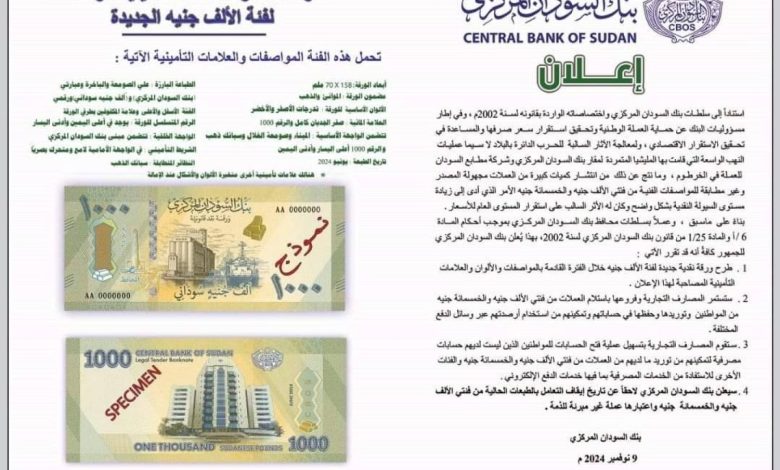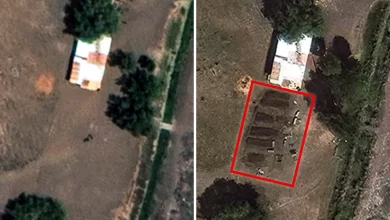The Sudanese Pound Enters the Battlefield Between the Army and the Rapid Support Forces

Sudan Events – Agencies
Debate has intensified over the Sudanese authorities’ decision to change large currency denominations, more than 18 months after the war broke out in the country. Some analysts suggest that this decision aims to use currency as a weapon in the conflict, intending to drain cash from areas controlled by the Rapid Support Forces (RSF) and redirect it to the official banking system.
The Central Bank announced last Saturday that it will issue a new 1,000-pound banknote, the largest denomination in circulation, with enhanced security features to prevent counterfeiting.
The bank attributed these changes to “protecting the national currency, stabilizing the exchange rate, economic stability, and addressing the negative impacts of the war,” especially the widespread looting by RSF militia of the Central Bank and currency printing facilities in the capital, Khartoum. According to the Central Bank, this has led to “a large spread of counterfeit and technically non-compliant 1,000-pound and 500-pound notes, which has noticeably increased liquidity and negatively affected general price stability.”
However, in a statement, the RSF claimed that the currency change is “politically motivated and part of a plan to divide Sudan and separate its regions.”
The RSF argued that “the decision lacks legal justification and contradicts financial protections for individuals amid crises and wars, given the collapse and dysfunction of the banking system in most regions of the country.” It urged citizens to “reject the decision and refrain from using the new currency, considering it non-exempting from liability.”
The decision also burdens millions of citizens who must exchange their old currency for new, particularly in RSF-controlled areas like Darfur, Khartoum, Al-Jazira, and several cities in Kordofan State.
Omar Abdelsalam, a resident of a neighborhood in southern Khartoum, remarked, “There are no functioning banks in Khartoum to exchange money; most people lack cash and rely on mobile banking applications.”
He added, “With frequent interruptions to communication and internet services, most transfers are done through RSF personnel, who have satellite-based Starlink communication devices, effectively giving them control over financial flows.”
Banking and economic experts view the currency change as a “long-overdue step,” meant to counter the RSF’s financial gains and redirect currency flow to government-controlled areas.
Catastrophic Consequences
A former senior official from the Central Bank, who preferred to remain anonymous, commented that “the decision has no economic basis typical of currency changes. It is a political move designed to serve military aims in government-held areas.”
The official, who has witnessed several currency changes in Sudan, described the decision as “the first step towards potential national division.”
He added, “The design and signature for the new banknote are complete, and it is set to enter the printing stage.”
According to the official, the RSF may resort to using the U.S. dollar for trade and barter in border states near neighboring countries (Chad, Central African Republic, Libya, and South Sudan), where the dollar is a key currency.
He warned, “The main issue is that this decision could create an emotional divide among Sudanese, worsened by hate speech, racism, and abuses committed by both warring sides.”
He continued, “The consequences of this decision are catastrophic, potentially leading to two currency systems in the country and a split in monetary policy with neither side recognizing the other.”
He pointed to the 2011 currency change following South Sudan’s secession, “which was conducted in complete secrecy without the knowledge of senior Central Bank officials.”
He predicted that the RSF might take countermeasures by legalizing foreign currency use, especially in border trade, leading to an expanded and formalized foreign exchange market.
He explained, “Common reasons for a state to change its currency include capturing cash outside the banking system, controlling the cash supply, tackling inflation, and addressing government fiscal deficits.”
He expressed doubt that the Sudanese government would have the new currency printed by companies in major countries outside the global banking system.
Banking expert Hashim Abdullah Rahma told Asharq Al-Awsat that changing the currency now “is pointless and would have had economic benefits only if implemented immediately after the RSF seized domestic and foreign currency reserves, as well as gold bullion, from the national mint and local banks.”
Inopportune Timing
The Central Bank stated in a public announcement that commercial banks would facilitate the opening of new accounts for citizens to enable them to deposit their 1,000-pound, 500-pound, and other denominations to benefit from electronic banking services.
Economic expert Ibrahim Onour argued that “the timing of this decision is completely inappropriate and unlikely to reduce inflation.” He highlighted that citizens in RSF-controlled areas face challenges in exchanging their old currency, with no banks or financial institutions operating in those regions.
Banking expert Hisham Abdullah noted that “if the goal of the currency change is to cut liquidity in RSF-controlled areas, it can be achieved only if the Central Bank sets a short deadline—no longer than two weeks—for citizens to deposit their old banknotes.” He criticized the government’s lack of foresight, suggesting that “in cases of internal or external conflicts, strategic measures should be promptly enacted, like forming a war-time administration with the expertise to manage economic matters effectively in stable regions.”
Due to the precarious security situation in Khartoum, the Central Bank announced in May 2023 that it would relocate its operations to the temporary capital in Port Sudan in the country’s east.
Since the war erupted in April of the previous year, the use of paper currency has sharply declined in active conflict zones, with millions relying heavily on digital transfers via banking apps.



